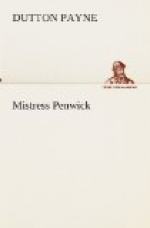“Thou, Constance, art the receptacle of all the damned ills flung from mortals, whether of the mind or body. As for soul, that unknown thing to thee—thou canst not recognize in another and therefore canst take on nothing of it save its punishment hereafter, when thou shalt have no choice of condiment. Thy heart lies festering in the rheum that exuviates from its foul surroundings. Conscience thou art bankrupt of, and in its place doth lurk the bawd that envenoms thy senses and turns thy narrow body into prodigious corruption—”
“Cedric,—my God; stay thy tongue!”
“Nay, nay; my tongue is a well-matched Jehu for thy devil’s race. I would I might scorch thee with it, to give thee foretaste of that to come; perchance ’twould seethe thy rottenness to the quick—if thou of that art not also bereft—and turn thee from thy course. Thou dost pander for the King’s son and steal an innocent maid of unripe years to gratify his lust—ah, ’sdeath! thou art but a pernicious wench, as false as hell. And when the nurse whispered that ’twould save the child from shame, thy protrusile tang-of-a-serpent didst sibilate in his ready ear a denial—”
“Cedric, Cedric; cease, I pray!” And Constance fell upon her knees sobbing. But the young lord’s storm had not yet spent itself, and he sped on in fury:
“I would thy noxious blood had all run out ere mingling with its better, and I had naught of so foul a taint within. If I held the apothecary’s skill, I would open my veins and purge from them thy jaundiced blood and let in slime of snakes and putrid matter to sweeten the vessel thus set free—”
“My lord, we must hasten. The maid is ready to depart with her nurse,” said Sir Julian. As the young lord turned to him, Lady Constance—crushed and broken—said,—
“Couldst thou not see why I have so misused my better self; have thine eyes been blind all these years not to see how I have loved thee, Cedric—thee—thee—with all my heart and soul?”
“I would not hear thee prate of anything so sacred as love,—’tis sacrilege.”
“Nay, not so, Cedric! I love thee more than heaven. I love thy scorn, if to be free from it were to deprive me of thy presence. I would follow thee to the end of time, even though thy brow lowered in ever threatening storm—”
“Nay! thou shalt not follow me. Would I draw such as thou to yonder maid? From this moment thou art none of mine, and I fling thee from me as I would a snake.—Thou didst think to take Mistress Katherine from me; put her beyond my reach, first, by marriage, then by ruin. Thanks to heaven, both of thy infernal schemes miscarried and she is again in my keeping. And soon I shall fold her to me as my own; pillow her head here, Constance, here, where thou sayest thou shouldst love to lie. I shall press her to my heart as wife, wife—ah! I have at last touched the quick within thee. We may hope there is some redemption—some possibility of bringing thee back from thy foulness—”




